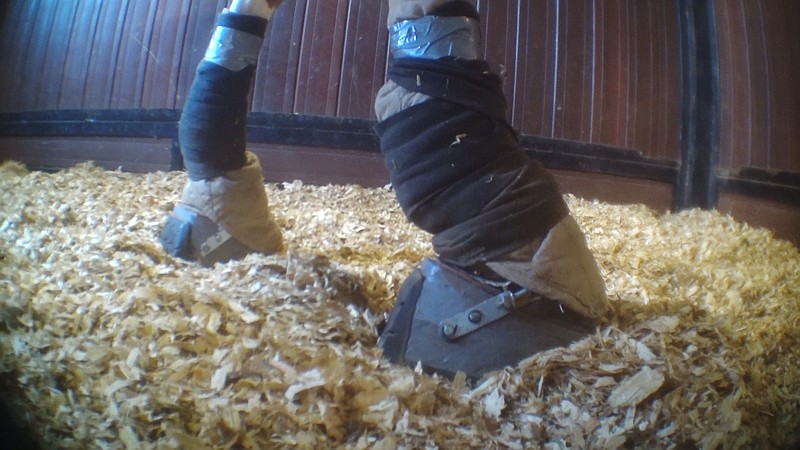Just hours after Shelbyville trainer Bill Callaway won the Tennessee Walking Horse World Grand Championship, Callaway's trainer license was suspended for eight months for violating the federal Horse Protection Act. He also was fined $1,100 by the U.S. Department of Agriculture.
Here's the kicker: The suspension stems from a complaint filed in January, according to the Shelbyville Times-Gazette. Calloway told former Times Free Press reporter (now a Shelbyville Times-Gazette reporter) Jason Reynolds that he couldn't afford to fight the case so he made a deal with USDA.
And apparently part of that deal bought him time to win the biggest walking horse title in the world.
"Bill Callaway began an eight-month suspension from any participation in horse shows for an alleged violation of the federal Horse Protection Act about 24 hours after riding Gen's Black Maverick to the Tennessee Walking Horse World Grand Championship on Saturday," Reynolds wrote in a story published last week.
Callaway said there was no admission of guilt, and while he disagreed with the USDA's conclusions, he took the deal because he did not have the money to pay an attorney and because of the burden it would have placed on his family.
Once the suspension is up, he's free to train and compete again. That riles the officials with the the Humane Society of the United States.
"So Callaway knew he'd be going on suspension, but apparently cut a deal that allowed him to show at the Celebration," writes Wayne Pacelle, president and chief executive officer of the Humane Society blog called A Humane Nation. "In a statement of how widespread and accepted soring is within the industry, the judges didn't hesitate to give Callaway the top prize anyway."
The Horse Protection Act was passed in 1970 in an effort to prevent the soring of walking horses. Soring is the practice of applying chemical irritants or illegal devices or deliberately painful shoeing to a horse's front feet or forelegs to make the animal lift its feet higher in the show ring - in response to the pain. Soring, a short-cut training method, became the rule rather than the exception in the big-name walking horse competitions in the 1960s.
The resulting "big lick" step turned the breed's natural smooth gait into an ugly lurch, but walking horse trainers don't seem to understand that they are ruining not just their horses, but their sport and livelihoods as well.
The annual 11-day Tennessee Walking Horse Celebration in Shelbyville has an outdoor arena with seating for 30,000, including box seats. For the past few years - and especially after Hall of Fame Trainer Jackie McConnell pleaded guilty in federal court here in Chattanooga after being caught mistreating horses on an undercover Humane Society video - the crowds have thinned. On most nights of the Celebration, perhaps a quarter of the seats are filled. Even on the final night when the world grand champion is chosen, only the lower stadium seats - fewer than half - are filled.
This year, on Thursday and Friday, not even a thousand people attended, perhaps fewer than 500, wrote Pacelle. During the Saturday night finale, the crowd topped out at a few thousand people.
Last November, we were buoyed by news that Tennessee Walking Horses might finally be freed from the stacks and chains that help transform their graceful natural gait into that painful lurch and help make them sore.
The USDA announced new rules to upgrade Horse Protection Act regulations. Those new rules would have banned the devices that contribute to horse soring. The department was taking the action because a bill to similarly amend the law had been bottled up in committees for several years despite near unanimous support among lawmakers. The bottlenecks were from lawmakers in Tennessee and Kentucky - the biggest big lick states.
But the rules ran headlong into the Donald Trump administration. An unexplained failure of Federal Register personnel to properly publish the new USDA rule before President Barack Obama's term ended left the new rule vulnerable to a subsequent decision by the Trump administration to put a freeze for review on all pending rules. So the new rules have gone to limbo-land, now under Secretary of Agriculture Sonny Perdue - a farmer and a retired veterinarian.
And, no, sored walking horses are not a hoax. USDA statistics from random testing for prohibited foreign substances used to sore the legs of horses (or mask the evidence of soring) at horse shows in 2016 found that a whopping 75.4 percent of all those samples tested positive, including 89.5 percent tested at the 2016 Celebration. And despite industry vows to clean itself up, those horrendous findings represented an increase over 2015, when 65.1 percent of all samples tested positive, including 87.5 percent at the Celebration.
Additionally, USDA reports that about 90 percent of alleged violations of the Horse Protection Act at all horse shows from 2010-2015 involved horses wearing stacks or pads.
The horse industry and its supporters are strong and moneyed. Over the years, they have successfully thwarted reform efforts.
Once and for all, let's rise up to protect these horses, along with Tennessee's good name.
